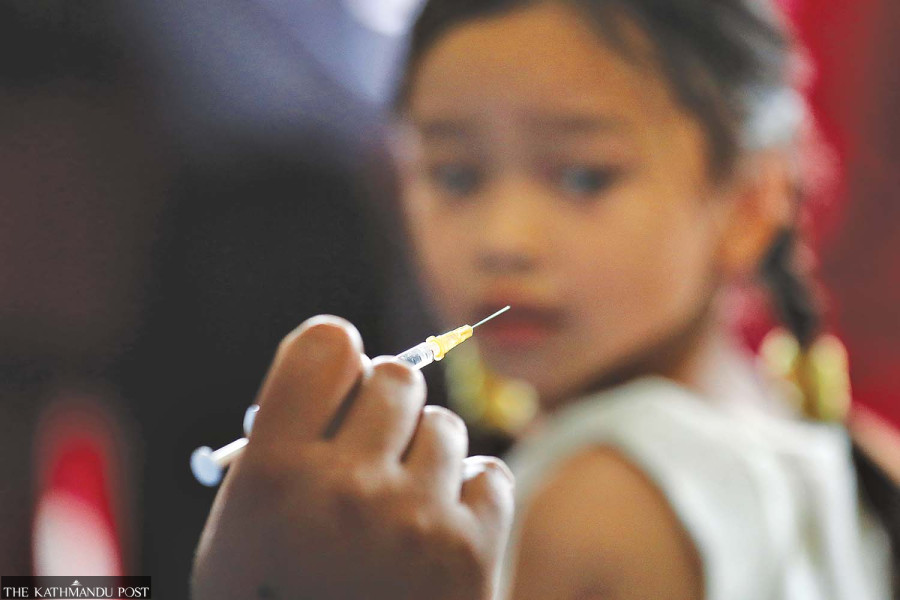Health
Massive health budget cuts loom, all programmes to be affected
This could jeopardise progress achieved from years of investment, warn experts.
Arjun Poudel
With the national budget day in parliament coming closer, officials at most agencies under the Ministry of Health and Population are busy preparing an annual budget for their respective sections.
However, what's bothering them the most this year is the directive from the Ministry of Finance for ‘massive cuts’ in their annual budget.
“We have been asked to cut down the annual budget by up to 42 percent,” an official at the Health Ministry told the Post, requesting not to be named, since the official is not authorised to speak to the media.
"The problem is not of any particular department or agency, but of all the agencies.”
The government presents the annual budget in Parliament on Jestha 15 every year (it will fall on May 29 this year).
The government had already downsized the total budget by a substantial 13.59 percent totalling Rs 243.83 billion for the ongoing fiscal year 2022-23 citing a plunge in revenue collection. According to officials, it is the largest cut in the ministry's outlay, to date. The government cited its inability to ensure necessary funding for the cut.
Officials say it is for the first time since the fiscal year 1967-68 that the country has witnessed a negative growth in revenue collection during the first six months of the fiscal year.
“For the upcoming fiscal year’s budget, we are being asked for a massive cut,” Dr Roshan Pokhrel, secretary for Health, told the Post. “Most of our regular programmes will be affected, if the budget of healthcare is slashed by such a big percentage, at once.”
According to officials at the Health Ministry, the massive cut in budget will directly affect the country’s priority programmes, including those of maternal health, child health immunisation, nutrition, HIV, tuberculosis, epidemic control, control of non-communicable diseases, mental health, ayurveda and alternative medicines.
“We have witnessed outbreaks of several diseases including dengue, cholera and diarrheal diseases, and other vector-borne diseases. Also, Covid cases are rising again,” said Dr Bibek Kumar Lal, director at the Family Welfare Division under the Department of Health Services. “If the regular budget for healthcare is cut by such a high percentage, it will have severe negative impacts and the progress that we have made from years of investments and by efforts will get jeopardised."
Every year, the finance ministry asks all the ministries to prepare budget proposals for themselves and forward it to the finance ministry and based on those proposals, the ministry prepares the annual budget of the country to be presented in and endorsed by parliament. For that, the finance ministry sets a ceiling under which they have to submit their proposal. This time around, the finance ministry has fixed the ceiling which is 42 percent lower than the total budget of the health ministry this fiscal year.
The incumbent government has already slashed the budget for the Covid vaccination programme.
Along with the vaccination budget, the budget for paying lab technicians, who were hired throughout the country to carry out polymerase chain reaction (PCR) tests, has also been slashed, and this is among the major reasons behind fewer Covid tests being conducted, despite a surging infection rate, the officials said.
Due to a lack of proper budget, health authorities failed to expand verbal autopsy, a method of determining the cause of maternal death when no medical record or formal autopsy is available. In Nepal, this method is being used to determine the causes of maternal deaths in 42 of the 77 districts.
The Nepal Demographic and Health Survey-2022 carried out by the Ministry of Health and Population showed that at least four percent of the children aged 12 to 23 months have received no vaccination at all.
“Prime Minister Pushpa Kamal Dahal announced that the government would provide free treatment to women suffering from cervical and breast cancer,” said Lal. “Free screening for cervical cancer by state-run health facilities throughout the country and administering vaccines against human papillomavirus are among the measures the prime minister outlined for the future to minimise the deaths of women from preventable cancers. But how will it be possible after massive budget cuts?"
Budget cuts for mosquito nets and testing kits have already affected the malaria elimination programme, according to officials.
They say that the plan was to procure 180,000 lasting insecticide-treated bed nets for the ongoing fiscal year, but only 120,000 nets could be purchased. The Epidemiology and Disease Control Division had planned to buy 500,000 malaria testing rapid diagnostic kits for the ongoing fiscal year, but it could purchase only 315,000 pieces.
Officials say that budget cuts will also affect the awareness drive, which is very much crucial to reducing the burden of diseases.
"We have been trying to convince concerned officials at the finance ministry not to cut the health budget," said secretary Pokhrel.
Experts caution the budgetary cuts in crucial programmes of healthcare would have a long-term impact and could affect the achievements made over the years.
“Massive budget cuts in health care, which has not happened since the start of the public health programmes, would have serious consequences,” said Dr Baburam Marasini, a former director of the Epidemiology and Disease Control Division. “We can lose several achievements made through years of investments and efforts,” he warned.




 20.12°C Kathmandu
20.12°C Kathmandu















